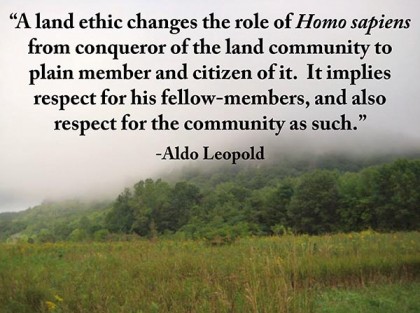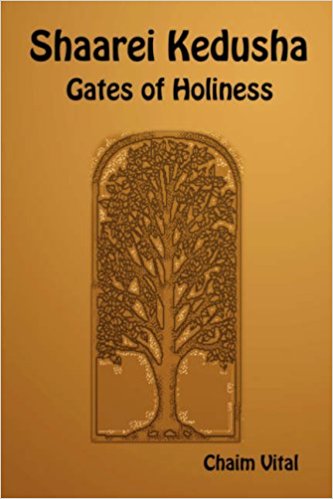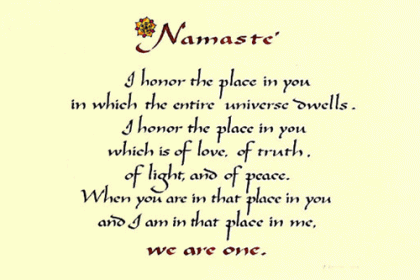Beltane Rushing Waters Moon
Working on a presentation for our mussar class at Beth Evergreen. Want to include Berry’s idea of the great work for our generation: creating a sustainable human presence on earth.
 Also want to include Aldo Leopold’s land ethic:
Also want to include Aldo Leopold’s land ethic:
“All ethics so far evolved rest upon a single premise: that the individual is a member of a community of interdependent parts.The land ethic simply enlarges the boundaries of the community to include soils, waters, plants and animals, or collectively the land.” The Land Ethic, A Sand County Almanac.
 The date of the presentation happens to be Emerson’s birthday. So, from Nature: “The foregoing generations beheld God and nature face to face; we, through their eyes. Why should not we also enjoy an original relation to the universe? Why should not we have a poetry and philosophy of insight and not of tradition, and a religion by revelation to us, and not the history of theirs? Embosomed for a season in nature, whose floods of life stream around and through us, and invite us by the powers they supply, to action proportioned to nature, why should we grope among the dry bones of the past, or put the living generation into masquerade out of its faded wardrobe? The sun shines to-day also. There is more wool and flax in the fields. There are new lands, new men, new thoughts. Let us demand our own works and laws and worship.” introduction to his essay, Nature.
The date of the presentation happens to be Emerson’s birthday. So, from Nature: “The foregoing generations beheld God and nature face to face; we, through their eyes. Why should not we also enjoy an original relation to the universe? Why should not we have a poetry and philosophy of insight and not of tradition, and a religion by revelation to us, and not the history of theirs? Embosomed for a season in nature, whose floods of life stream around and through us, and invite us by the powers they supply, to action proportioned to nature, why should we grope among the dry bones of the past, or put the living generation into masquerade out of its faded wardrobe? The sun shines to-day also. There is more wool and flax in the fields. There are new lands, new men, new thoughts. Let us demand our own works and laws and worship.” introduction to his essay, Nature.
Linking up with the parsha* (Torah portion read in Shabbat services) I found Leviticus 25 filled with interesting ideas about the land. Here are a couple that fit well with these ideas.
Lev. 25:18 “…you shall live on the land securely.”
Lev. 25:23 “…the land shall not be sold permanently for the land belongs to Me, for you are all strangers and temporary residents with me.”
Of course, this is a mussar class so all of this has to connect with the Mesillat Yesharim, Path of the Upright, that we’re reading. To do that I think kedusha, holiness, hasidut, piety, and chesed, loving-kindness are key. These last two come from the same root.
 Here are some ideas about holiness from the parsha of a couple of weeks ago, Kedoshim. Leviticus 19:2b: “You shall be holy, for I, the Lord your God, am holy.” In commentary on Kedoshim the Conservative text* that I have quotes many famous Jewish scholars.
Here are some ideas about holiness from the parsha of a couple of weeks ago, Kedoshim. Leviticus 19:2b: “You shall be holy, for I, the Lord your God, am holy.” In commentary on Kedoshim the Conservative text* that I have quotes many famous Jewish scholars.
Martin Buber: Holiness is not found in rising above one’s neighbors but in relationships, in human beings recognizing the latent divinity of other people, even as God recognizes the divinity in each of us. The commentary adds, “As human beings we can be Godlike by exercising our powers to sanctify moments and objects in our lives.” Namaste.
I can also link this idea to the Japanese ichi-go ichi-e, once in a lifetime, attitude gleaned from the work of Japanese tea masters, especially the renowned Sen no Rikyū. He learned ichi-go ichi-e from his master, Takeno Jōō. “Jōō believed that each meeting should be treasured because it can never be reproduced.” wikipedia

Another of my favorite Japanese ideas is shinrin-yoku or forest-bathing. Here’s a one-line summary from the website linked to here. “The idea is simple: if a person simply visits a natural area and walks in a relaxed way there are calming, rejuvenating and restorative benefits to be achieved.”
More from the commentary on Kedoshim: “The modern distinction between “religious” and “secular” is unknown to the Torah. Everything we do has the potential of being holy.”
Again, from Buber, “Judaism does not divide life into the holy and the profane, but into the holy and the not-yet holy.” Another scholar, a man named Finklestein, adds, “Judaism is a way of life that endeavors to transform virtually every human action into a means of communion with God.” or, perhaps with a pagan sensibility, ichi-go ichi-e.
 I say perhaps intentionally because my reimagined faith could intersect with these ideas in a positive way, especially so if the locus of the divine is the individual soul, that part of us that connects with collective unconscious, Brahma, the three Sephirot: kether, the crown, chochmah, wisdom and binah, understanding, that part of the other to which we bow when we say Namaste. Or, as I quoted Buber earlier, “Holiness is not found in rising above one’s neighbors but in relationships, in human beings recognizing the latent divinity of other people…”
I say perhaps intentionally because my reimagined faith could intersect with these ideas in a positive way, especially so if the locus of the divine is the individual soul, that part of us that connects with collective unconscious, Brahma, the three Sephirot: kether, the crown, chochmah, wisdom and binah, understanding, that part of the other to which we bow when we say Namaste. Or, as I quoted Buber earlier, “Holiness is not found in rising above one’s neighbors but in relationships, in human beings recognizing the latent divinity of other people…”
This, too, is in the commentary: “…(find) ways of sanctifying every moment of your life. We can be as holy as we allow ourselves to be.” again, the Japanese ichi-go ichi-e and shinrin-yoku.
I’m also trying to pick up some ideas about Hebrew roots but that, so far, has eluded me.
Somewhere in this stew is enough material for a session. Just gotta sort it out.
*Etz Hayim, Torah and Commentary, The Rabbinical Assembly, The United Synagogue of Conservative Judaism. 2001. New York, N.Y. 10027
